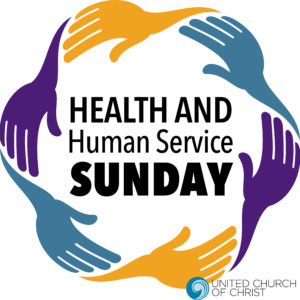Celebrate CHHSM on the UCC’s Health and Human Service Sunday, Jan. 27
 In 1858, UCC forebear the Rev. Louis Edward Nollau appealed to his congregation — today St. Peter’s UCC in Ferguson, Mo. — for money to build a home to support young children orphaned by a cholera epidemic. Today, as Every Child’s Hope, that home still serves the changing needs of children. The call to serve others in health and human services carries on today through the UCC’s Council for Health and Human Service Ministries.
In 1858, UCC forebear the Rev. Louis Edward Nollau appealed to his congregation — today St. Peter’s UCC in Ferguson, Mo. — for money to build a home to support young children orphaned by a cholera epidemic. Today, as Every Child’s Hope, that home still serves the changing needs of children. The call to serve others in health and human services carries on today through the UCC’s Council for Health and Human Service Ministries.
The UCC’s Health and Human Service Sunday — to be held Jan. 27 this year — lifts up the rich history of CHHSM ministries across the country, as well as the many ways they answer their call to provide faith-based servant leadership in their local communities. Often founded by local congregations, these CHHSM members include more than 400 health care centers; affordable housing and retirement communities; homeless shelters; service centers for children, youth and families; care agencies for people with developmental disabilities; and acute care hospitals.
“I believe the interaction between CHHSM ministries and local churches is important because it reminds church members that as the body of Christ, we have the responsibility of engaging in the healing and caring ministry of Christ as reflected in his years on earth,” says the Rev. Laverne Joseph, CEO of Retirement Housing Foundation, one of the nation’s largest nonprofit providers of housing and services for older adults, low-income families and persons with disabilities. “It also reminds CHHSM members that we do so not for our personal gain or glory, but because we want to imitate Jesus and help persons experience abundant life. We are the Church.”
It’s often easy to forget that CHHSM ministries are, first and foremost, faith-based agencies, says Kyle Zanker, chief development officer at Crossroad Child and Family Services in Fort Wayne, Ind. So partnerships between local churches and CHHSM members are invaluable. “Every time I speak at a church, something happens,” Zanker says. “When you share your story with a congregation, it becomes real to them.”
To help churches celebrate during worship, CHHSM offers a variety of suggested scriptures, a prepared liturgy, and graphics for church bulletins. The UCC bulletin service also features CHHSM’s advocacy work that Sunday.
“Health and Human Service Sunday is an opportunity for the church to create awareness about health concerns, address issue of justice in health care, and share information about various health and human service ministries,” says Michael J. Readinger, CHHSM president and CEO. “Not only do CHHSM ministries provide health care and human services; they also advocate for the people they serve.”
An example of that advocacy is a resolution CHHSM will bring to the UCC’s biennial General Synod this summer calling on UCC members to advocate for better access to treatment of opioid addiction, and to call attention to how pharmaceutical companies have contributed to the problem.
For the Rev. Kenneth Daniel, president and CEO of United Church Homes and its network of retirement communities across the country, the relationship between local churches and United Church Homes is essential.
“Our church relationship is critical to our effectiveness in fulfilling our mission,” Daniel says. “The more our congregations understand about the scope of services and ministries that United Church Homes provides, the more they can see their extended mission efforts in action.”
Daniel sees the local church-CHHSM member relationship as just one part of the larger UCC covenant of ministries. He uses United Church Homes as an example. “UCH was founded by congregations. Through prayer, volunteers, financial contribution, and board involvement, our churches continue to support UCH’s mission and ministries,” says Daniel. “And UCH is a component of our denomination’s national and global health and human service legacy embodied by all our CHHSM members. As our pastors and churches understand these relationships, the more our members can appreciate the scope and scale of how their shared ministries have grown over time.”
Readinger concurs. “CHHSM ministries are not an ‘extension’ of the church,” he says. “We are the church in action, and our bold witness is the bold witness of the whole church as — together — we create a just, caring and compassionate world for all.”
Access resources for Health and Human Service Sunday.
This story first appeared in United Church News.
Join Our Mailing LIst
"*" indicates required fields
Follow on Facebook
CHHSM Nollau Consecration Service
nam11.safelinks.protection.outlook.com
The Nollau Consecration service is a deeply spiritual and celebratory event where the 2024-2025 class of CHHSM's Nollau Leadership Institute will be consecra...